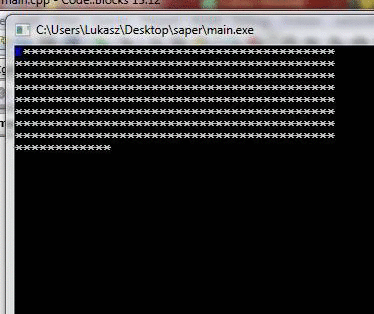Witam,
jestem początkujący w C++. Muszę napisać sapera, ale mam problem z wywołaniem funkcji. Obecnie jest to tak, że wywołuję metodę wyświetlania planszy w pęli while z przerwą 60ms do czasu gdy parametr while będzie prawdą. Problemem jest to, że plansza odświeżą się co 60ms i widać to jak ona się odświeża. Co powoduję, że ekran skaczę. Nie bardzo mogę zwiększyć tych 60ms, bo wtedy wciśnięte klawisze reagują z opóżnieniem. Czy da się jakoś zrobić, żeby kod w pętli while(linia: 181-182) był wywoływany po wciśnięciu klawiszów takich jak: strzałka w lewo, prawo, w górę, w dół i enter? I przy okazji, żeby sam program nie kończył pracy gdy nie ma nic już do roboty?
Tak to wygląda:

Źródło:
#include <iostream>
#include <cstdlib>
#include <windows.h>
#define xlength 40
#define ylength 20
#define level_easy 100
#define left 0x25
#define right 0x27
#define top 0x28
#define bottom 0x26
#define enter 0x0D
using namespace std;
class saper {
struct field {
int value;
bool display;
};
int positionX = 0;
int positionY = 0;
bool status = false;
field grid[xlength][ylength];
void minesGenerate() {
for(int i = 0;i<level_easy;i++) {
int tmp_x = rand() % xlength;
int tmp_y = rand() % ylength;
if(grid[tmp_x][tmp_y].value == 9) {
i--;
}
else {
this->mines(tmp_x,tmp_y);
}
}
}
void generateGrid() {
for(int y=0;y<ylength;y++) {
for(int x=0;x<xlength;x++) {
grid[x][y].value = 0;
grid[x][y].display = false;
}
}
this->minesGenerate();
}
void mines(int x, int y) {
grid[x][y].value = 9;
for(int i=-1;i<=1;i++) {
for(int j=-1;j<=1;j++) {
if(x+j >= 0 && x+j <= xlength-1 && y+i >= 0 && y+i <= ylength-1) {
if(grid[x+j][y+i].value != 9) {
grid[x+j][y+i].value += 1;
}
}
}
}
}
void gridUpdate(int x, int y) {
if(x-1 >= 0) {
if(grid[x-1][y].value == 0 && grid[x-1][y].display == false) {
grid[x-1][y].display = true;
this->gridUpdate(x-1,y);
}
}
if(x <= xlength) {
if(grid[x+1][y].value == 0 && grid[x+1][y].display == false) {
grid[x+1][y].display = true;
this->gridUpdate(x+1,y);
}
}
if(y-1 >= 0) {
if(grid[x][y-1].value == 0 && grid[x][y-1].display == false) {
grid[x][y-1].display = true;
this->gridUpdate(x,y-1);
}
}
if(y <= ylength) {
if(grid[x][y+1].value == 0 && grid[x][y+1].display == false) {
grid[x][y+1].display = true;
this->gridUpdate(x,y+1);
}
}
}
public:
saper() {
this->generateGrid();
}
bool getStatus() {
return this->status;
}
void setStatus(bool bl) {
this->status = bl;
}
void gridView() {
system ("cls");
for(int y=0;y<ylength;y++) {
for(int x=0;x<xlength;x++) {
if (x==positionX && y==positionY) {
SetConsoleTextAttribute( GetStdHandle( STD_OUTPUT_HANDLE ), 0x09);
cout << "X";
}
else {
SetConsoleTextAttribute( GetStdHandle( STD_OUTPUT_HANDLE ), 0x07);
if(grid[x][y].display == false) {
cout << "*";
}
else {
if(grid[x][y].value == 9) {
cout << "#";
}
else if(grid[x][y].value == 0) {
cout << " ";
}
else {
cout << grid[x][y].value;
}
}
}
SetConsoleTextAttribute( GetStdHandle( STD_OUTPUT_HANDLE ), 0x07);
}
cout << endl;
}
}
void saperMain() {
if((GetKeyState(right) & 0x8000) && positionX<xlength-1) positionX++;
if((GetKeyState(left) & 0x8000) && positionX>0) positionX--;
if((GetKeyState(top) & 0x8000) && positionY<ylength-1) positionY++;
if((GetKeyState(bottom) & 0x8000) && positionY>0) positionY--;
if(GetKeyState(enter) & 0x8000) {
grid[positionX][positionY].display = true;
if(grid[positionX][positionY].value == 9) {
//this->setStatus(true);
}
if(grid[positionX][positionY].value == 0) {
this->gridUpdate(positionX, positionY);
}
}
this->gridView();
}
};
int main(int argc, char** argv) {
saper s;
s.saperMain();
while(!s.getStatus()) {
Sleep(60);
s.saperMain();
}
cout << endl << "PRZEGRALES";
Sleep(5000);
return 0;
}